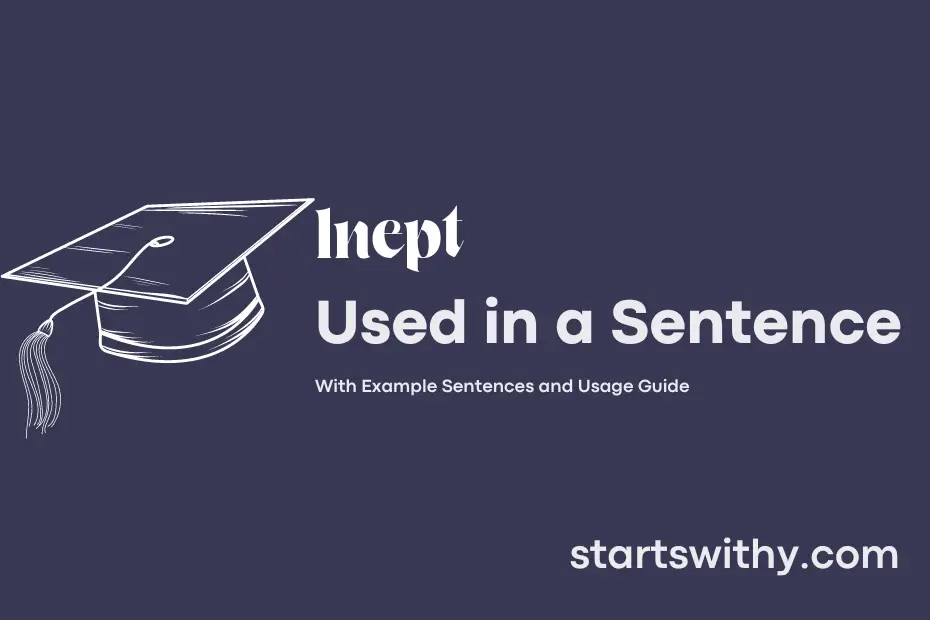Have you ever struggled to complete a task due to a lack of skill or ability? This feeling of incompetence is what we call ineptitude. It refers to the state of being unskilled, unqualified, or not capable of performing a specific action effectively.
When someone is inept, they may make frequent mistakes, lack coordination, or display an overall sense of inability in a particular area. This can lead to inefficiency, frustration, and often the need for additional training or support to improve their performance.
7 Examples Of Inept Used In a Sentence For Kids
- The clown was inept at juggling balls.
- The kitten was inept at catching the butterfly.
- The robot was inept at dancing to the music.
- The bear was inept at painting with his paws.
- The bunny was inept at playing hide and seek.
- The frog was inept at balancing on a lily pad.
- The elephant was inept at blowing bubbles with its trunk.
14 Sentences with Inept Examples
- During the project presentation, the group members realized that one of them was *inept at researching the necessary information.*
- The professor found it frustrating to explain a simple concept multiple times to an *inept student.*
- The student’s *inept time management skills led to late submission of assignments on multiple occasions.*
- Despite attending regular classes, some students felt *inept at grasping complex mathematical theories.*
- The *inept use of referencing in the research paper resulted in a lower grade than expected.*
- Students who were *inept at public speaking found giving presentations a nerve-wracking experience.*
- The group project suffered due to one member’s *inept communication skills and lack of contribution.*
- An *inept understanding of coding languages left some students struggling during computer programming classes.*
- Attempting to solve advanced calculus problems without the required knowledge proved to be a task for the *inept student.*
- Some students were labeled *inept at multitasking due to their inability to juggle academics, extracurricular activities, and personal commitments effectively.*
- An *inept attempt at budgeting led to financial stress for a student trying to manage college expenses.*
- The student’s *inept note-taking skills made it challenging for them to revise effectively during exam time.*
- An *inept understanding of the subject matter was evident in the vague and incomplete answers provided by some students during assessments.*
- Lacking computer skills made it difficult for some students to complete online assignments, highlighting their *inept knowledge in the area.*
How To Use Inept in Sentences?
To use the word Inept in a sentence, you can follow these simple steps:
-
Understand the meaning of Inept: It means having or showing a lack of skill or ability. Synonyms for Inept include incompetent, clumsy, and unskilled.
-
Choose the right context: When using the word Inept, think about situations where someone is not skilled or capable of handling a task or situation effectively.
-
Construct your sentence: Here is an example sentence using the word Inept:
- “The new employee was inept at using the company’s software, causing delays in the project.”
-
Pay attention to grammar: Make sure the sentence is grammatically correct with proper punctuation and tense usage.
-
Expand your vocabulary: As you become more familiar with using Inept in a sentence, try incorporating it into conversations or writing to improve your language skills.
By following these steps, you can effectively incorporate the word Inept into your vocabulary and communication. Practice using it in various contexts to become more comfortable with its usage.
Conclusion
Inept sentences are characterized by their lack of skill or competence in effectively conveying meaning. They are often haphazard, confusing, or nonsensical, making it challenging for readers to grasp the intended message. These sentences can undermine the credibility of the writer and obscure the main ideas being communicated. For instance, “The report was filled with inept sentences that left the reader puzzled about the conclusions drawn.”
To avoid inept sentences, writers should strive for clarity, coherence, and precision in their communication. Proofreading and revising can help identify and rectify any inept sentences, ensuring the message is clear and easily understood. By improving sentence structure and ensuring proper grammar and vocabulary usage, writers can enhance the effectiveness of their communication and convey their ideas more convincingly.



